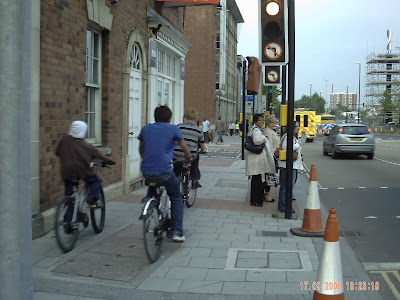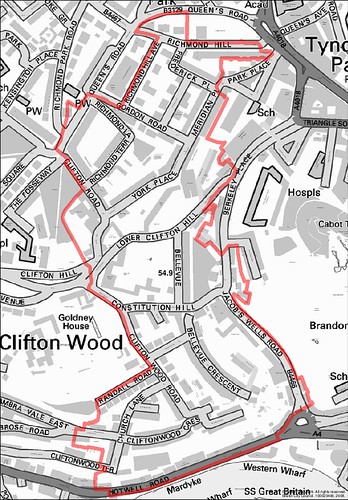With electioneering in full swing and some marginal wards along the Railway Path corridor to be fought for, it's not surprising that Political Parties are playing up their involvement in stalling the plan to run Bus Rapid Transit down the Railway Path. The Greens are certainly entitled to do so, as are the Liberal Democrats who eventually came out against
BRT on the Path despite their involvement in earlier stages of the plan's development.

But Labour have been trying to paint themselves as saviours of the Railway Path too, which might raise a few eyebrows amongst the hundreds involved in last year's hard fought campaign to persuade the Labour administration of Bristol City Council to drop the
BRT plans. Mark Bradshaw, the Executive Member for transport from May 2007 until February 2009 has been prominent in making such claims and I've had a few run-ins with him on
Twitter (see also my Tweets in the sidebar to the right).

But worst of all, as reported by the
Bristol Blogger, was the leaflet distributed on behalf of Labour's candidate for
Easton,
Mohammed Arif. Apart from tastelessly using a picture of of a prominent local Green,
Pete Taylor, who died recently, Labour were guilty of misrepresentation in that the petition being received by the Labour councillor in the picture was against the degradation of the Railway Path by the Chocolate Factory development and was nothing to do with the
BRT plan.
 Pete Taylor, supported by local campaigners including other Green Party activists, presents his Chocolate Factory petition to Labour Cllr Faruk Choudhury and Mohammed Arif (right) earlier this year.
Pete Taylor, supported by local campaigners including other Green Party activists, presents his Chocolate Factory petition to Labour Cllr Faruk Choudhury and Mohammed Arif (right) earlier this year.
So let's recap what happened over
BRT and the Railway Path early last year.
From May 2007 Labour were running the council (with Tory support) and Mark Bradshaw was the Executive Member for transport and development. As such he also had a key role with the West of England Partnership. He 'inherited' a range of initiatives including the
BRT plans to use the Railway Path.
Following widespread publicity from January 2008 onwards opposition to
BRT on the Railway Path grew massively and the Green Party were early supporters of the campaign, although individual members of other parties were also prominent, for example Paul Smith, Labour's
PPC for Bristol West.
Green Councillor Charlie Bolton submitted a motion to the April 1st 2008 Full Council meeting which was subsequently amended and supported by the Lib
Dems to read (my emphasis) -
Council notes the strength of feeling expressed by citizens of Bristol against the proposed bus rapid transit route along the much loved Bristol-Bath railway path. Council further recognises that cycling is a more sustainable transport solution than the use of public transport, and that as well as a ‘commute route’ the railway path is a valuable resource for local people for walking, cycling and enjoying the countryside in the heart of the town.
As such, while recognising the vital importance of improving public transport in Bristol, council regards the use of the railway path for bus rapid transit as an inappropriate solution. Council demands that the railway path option is dropped and concentration is given to other routes.
Council calls on the Executive Member for Access and Transport to pass these views on to the West of England Partnership and to make clear to partners and government that this route is unacceptable.
Council further calls for extra investment in the path to enhance the experience of walkers and cyclists including measures to improve public safety and believes that this will enhance Bristol chances of becoming Britain’s first cycling city.
The strong wording - "inappropriate; council demands that option is dropped; unacceptable" is unequivocal and would have killed off the
BRT on Path plan completely. However Labour, with Conservative support, defeated this motion by bringing in a 'wrecking amendment' which read as follows -
"Council notes the strength of feeling expressed by the citizens of Bristol against the possible shared use by rapid transit of the much loved Bristol-Bath cycle path."
"Council further recognises that walking and cycling are vital components of the strategy to encourage more sustainable and healthier travel behaviour in our city."
"While fully recognising the vital importance of improving public transport, Bristol City Council will oppose route proposals which undermine the current and future expansion of walking and cycling in Bristol, and, in particular, will oppose any threat to the current or future use of the Bristol to Bath cycle path."
"Council requires further information about the various route options, including those on roads and for these to be the subject of full public consultation."
"Council fully supports the Executive Member for Access & Environment in making these views known to the West of England Partnership."
There was a long debate on this on
The Bristol Blogger but most
commenters seemed to agree that the Labour motion consisted of
weasel words which could be interpreted in whatever way suited the politicians and were basically meaningless, so keeping the threat from
BRT to live another day.
















